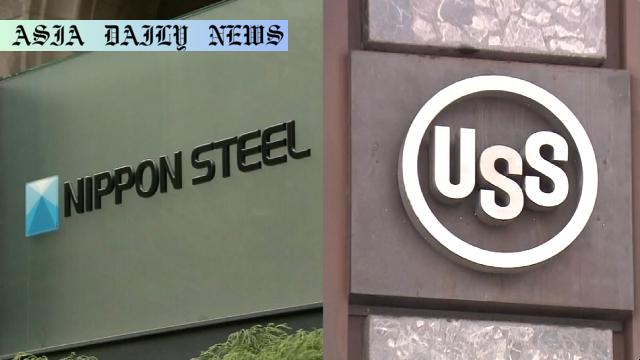US Steel: President Trump to address the partnership announced between US Steel and Japan’s Nippon Steel, with key details pending.
Trump will address the US Steel and Nippon Steel partnership on Friday.
The partnership includes potential U.S. veto power via a golden share.
The deal’s specific control structure remains under development.

Introduction to the US Steel Deal
The anticipated speech by President Donald Trump regarding the proposed partnership between US Steel Corporation and Japan’s Nippon Steel is drawing significant attention. Scheduled to be delivered at a US Steel plant near Pittsburgh, the address underscores the intricacies and implications of this potential deal. Trump’s promises to revitalize domestic manufacturing and create more employment opportunities in the steel sector align with this new development. While the notion of partnerships can pave the way for growth, the details surrounding this deal have raised questions and concerns about the control and strategic direction of US manufacturing.
The Proposed Partnership: Key Details
Nippon Steel’s initial proposition to turn US Steel into its wholly-owned subsidiary ignited considerable debate. President Trump, in response, expressed his reservation and later introduced an alternative framework—a partnership. The fruits of collaboration between the two steel giants could potentially redefine the operational landscape of the steel industry. However, ambiguity persists regarding what this partnership entails and how it balances interests between Japan and the United States.
One noteworthy aspect revealed through media speculation involves the possibility of the U.S. government obtaining a “golden share,” granting veto power over major company decisions. These decisions include matters like board member appointments and dismissals, enabling the U.S. to maintain oversight on strategic directions. If implemented, this unique mechanism would serve as a safeguard ensuring domestic control remains intact amidst this international collaboration.
The Implications for U.S. Manufacturing
The steel industry has historically been emblematic of America’s industrial prowess. Yet, challenges from international competitors have threatened its dominance over the decades. Trump’s presidency has seen numerous measures aimed at protecting and promoting the sector, ranging from tariffs to support for small steel businesses. The US Steel and Nippon Steel partnership is another step in this journey, presenting potential for innovation, investment, and growth. However, it also ignites speculation over whether too much reliance on foreign investments compromises the goal of “America First.”
The introduction of a golden share could offer a middle ground by welcoming foreign capital while maintaining significant U.S. control over key decisions. This approach is particularly vital in securing national interests without alienating global partnerships. As the details emerge, public and political perception of such a structural arrangement will be crucial for the deal’s sustainability.
Unanswered Questions and Future Directions
Despite Trump’s confidence in the partnership, several questions linger. How will profit sharing work? What specific terms are included to ensure US Steel’s autonomy? And how will this agreement impact the workforce and communities dependent on US Steel’s operations? Answering these questions is critical to addressing public skepticism and ensuring transparency in a politically significant deal.
President Trump’s emphasis on manufacturing and trade resonates with a vast portion of his voter base, ensuring this topic attracts attention worldwide. Building partnerships such as this is essential for shared growth, but ensuring these partnerships are equitable and balanced is vital for both domestic stability and international trust.
Conclusion
The crossroads of domestic manufacturing and foreign partnerships prompt broader discussions on leadership, industrial strategy, and international cooperation. While the US Steel and Nippon Steel deal presents an opportunity to bolster the steel industry, it must not come at the cost of long-term domestic control. As President Trump prepares to elaborate on this partnership, Americans and global observers alike anticipate additional clarity. If executed successfully, this collaboration may become a blueprint for balancing globalization with local interests in other industries as well.



Commentary
Balancing Economic Growth and Domestic Control
Throughout his presidency, Donald Trump has underscored the revival of U.S. manufacturing, a promise that resonates deeply with America’s industrial heartland. Announcing the potential partnership between US Steel and Nippon Steel is another step towards fulfilling this rhetoric. While international collaboration can undoubtedly catalyze economic growth through technology sharing and financial investment, it also comes with strings attached. Retaining domestic oversight in such agreements is crucial, as Trump’s advocacy for a “golden share” suggests.
The Importance of Strategic Partnerships
Collaboration between global corporations can unlock significant potential for innovation and market expansion. This proposed partnership between US Steel and Japan’s Nippon Steel showcases how such agreements could potentially balance resources and competencies of both parties, reviving the U.S. steel sector. However, care must be exercised to ensure the terms of partnerships respect national interests and local industry integrity while securing the benefits of external investments. The balance Trump appears to advocate—a relationship of mutual benefit led by American oversight—may become a template for future such agreements.
Broader Implications for the Steel Industry
The global steel industry has evolved significantly due to technological advancements and shifts in global demand. For the U.S., staying competitive requires leveraging partnerships that enable resource optimization while uplifting domestic industries. The golden share concept is particularly astute, applying a mechanism to regulate foreign influence while capitalizing on global collaboration. If employed correctly and transparently, this model could prove instrumental not just in salvaging the steel sector but also in reinforcing trust amongst stakeholders.
Ultimately, public perception of fairness, benefits, and control will decide the long-term viability of this partnership. By thoughtfully framing and executing this deal, the U.S. administration has the chance to demonstrate that globalization and domestic interests can coexist without compromise.